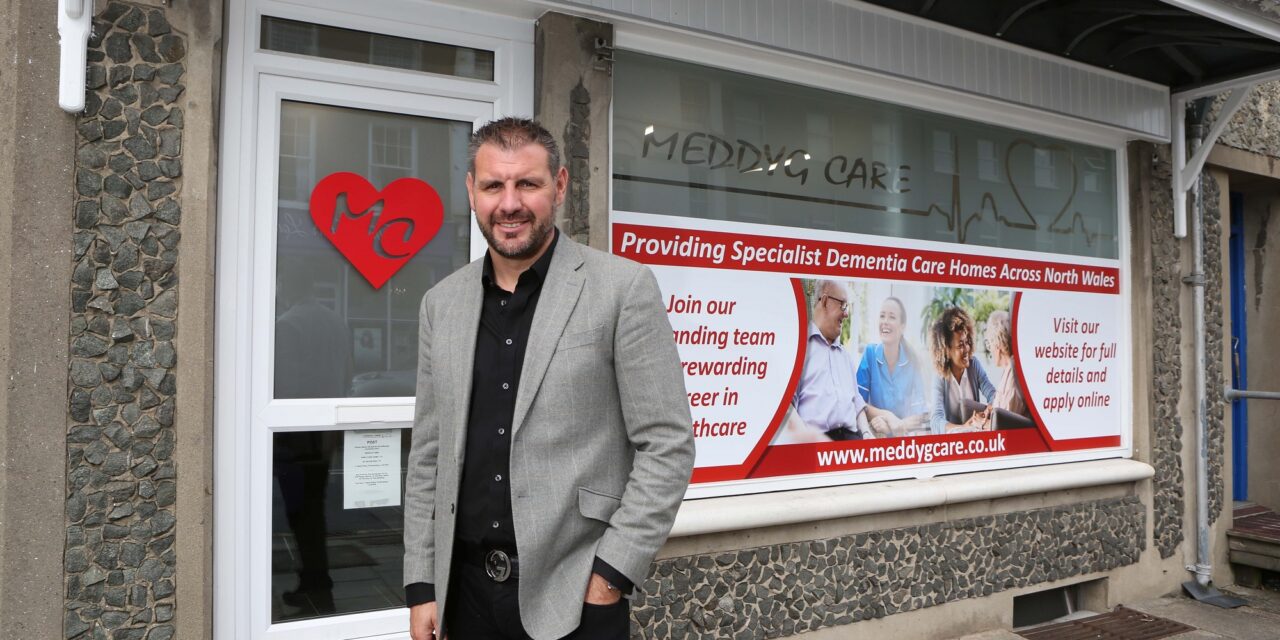A Gwynedd care home boss who took a council to court over unpaid fee arrears has accused the authority of blocking families from accessing specialist dementia care.
Kevin Edwards, owner of Meddyg Care Dementia Homes, issued a High Court writ against Gwynedd Council after it ignored a judgement made by Northampton Small Claims Court in April ordering it to repay £44,529 in fee arrears at its 40-bed Criccieth home.
The council has paid the outstanding debt after being told that High Court Enforcement Officers had the power to its seize assets.
But Mr Edwards claims the authority is now refusing to send any more residents there – except in an emergency – in favour of cheaper domiciliary care or care homes outside of the county that do not offer the same level of high-dependency support.
The situation was ‘absurd’ and he said it was in stark contrast to the position of other authorities outside of Gwynedd including Anglesey that are regularly placing individuals who require at the home and taking full advantage of the specialist care it provides.
He also accused Gwynedd Council of turning its back on local people and said it was failing in its responsibility to cater for their complex needs.
“In a nutshell, Gwynedd don’t want to pay for specialist dementia services. We are finding people being left in their houses to struggle at home where there’s a lack of domiciliary care,” he said.
“The council are telling families sorry we do not commission services from Meddyg Care, you have to go further afield but there’s a completely different perspective from other councils who accept that to access specialist dementia services they have to travel.
“Anglesey, for example, have placed 10 people over the last three weeks – they have no problem at all. Here, people are being sent out of area where Gwynedd Council can secure a cheaper deal.
“Gwynedd Council are depriving people of access to specialist dementia care services. We’ve had funding for one or two places because it’s been an emergency and it’s end of life care, at that stage there’s no quality of life left for them. Basically, they’re leaving it as late as possible before admitting them.
“It’s a long journey from when you are first diagnosed with dementia and despite the difficult circumstances, that journey should as enjoyable as possible. Gwynedd Council are not providing that support to facilitate that to the good people of the county. That’s extremely upsetting.”
Meddyg Care, which also owns a 44-bed home in Porthmadog, said it was left no choice but to launch legal proceedings in February this year after Gwynedd Council’s fees fell well short of the sum needed to provide adequate care for its clients and remunerate staff – forcing it to operate at a loss.
Social care champions Care Forum Wales (CFW) said the case was the first of its kind in Wales and demonstrated a gross and unlawful abuse of the council’s responsibilities to frail and vulnerable people in its communities.
The Council has now paid the outstanding bill but CFW said it was a small and meaningless victory for the people of Gwynedd who are still being denied the right to the high-level dementia care they need.
Mary Wimbury, the chief executive of CFW, said: “This is an appalling state of affairs with the biggest losers being the frail and most vulnerable people in our community.
“It seems bizarre that those living in Gwynedd cannot benefit from the specialist care being provided on their very own doorstep.
“By denying local people spaces until it’s too late, Gwynedd is basically stripping them of their rights and adding to the ongoing heartache and suffering of the patient and their loved ones.
“We have already highlighted that councils are ignoring their legal obligations to take into account the legitimate current and future costs faced by providers and this is just another example of an authority falling short of the public’s and sector’s expectations.
“Fortunately, Meddyg Care is not reliant on the council for admissions and has plenty of support elsewhere by councils who have the sense and compassion to recognise good services when it is offered to them.”
Mr Edwards said they were still in negotiation with Gwynedd Council but were frustrated by the lack of understanding being given to their unique position.
“I’ve said before we cannot operate this kind of service on the fees they want to pay,” he said.
“The long and short of it is our services cost more. Other councils can afford it and recognise this type of service does have value.
“Gwynedd is failing to recognise our location and how much harder it is for us to secure staff.
“They don’t want to recognise these challenges and are taking a one size all approach. That’s the frustration.
Gwynedd is failing to recognise our location and how much harder it is for us to secure staff on the Llŷn Peninsula even compared to Caernarfon. That’s the frustration.
“If they reached out to us to said let’s understand your costs and why, we would say no problem, we’ll talk it through.
“We’ve had a huge amount of support from our local community. They were shocked at how care homes are being treated.
“We should not have to take this course of action to get the money we were owed to us.”
Mr Edwards said the firm had signed up to the Real Living Wage Foundation last March to provide all its workers with the Real Living Wage of £9.90 per hour, going beyond the Welsh Government’s commitment. This added a five per cent increase to its fees but was vital for future sustainability.
“We offer specially trained staff that are recognised with Care Inspectorate Wales and are actively developing their careers in specialist dementia care,” he said.
“These are people with specialist skills who we need to harness in our local area otherwise they will go to other areas where they’re more appreciated.”










